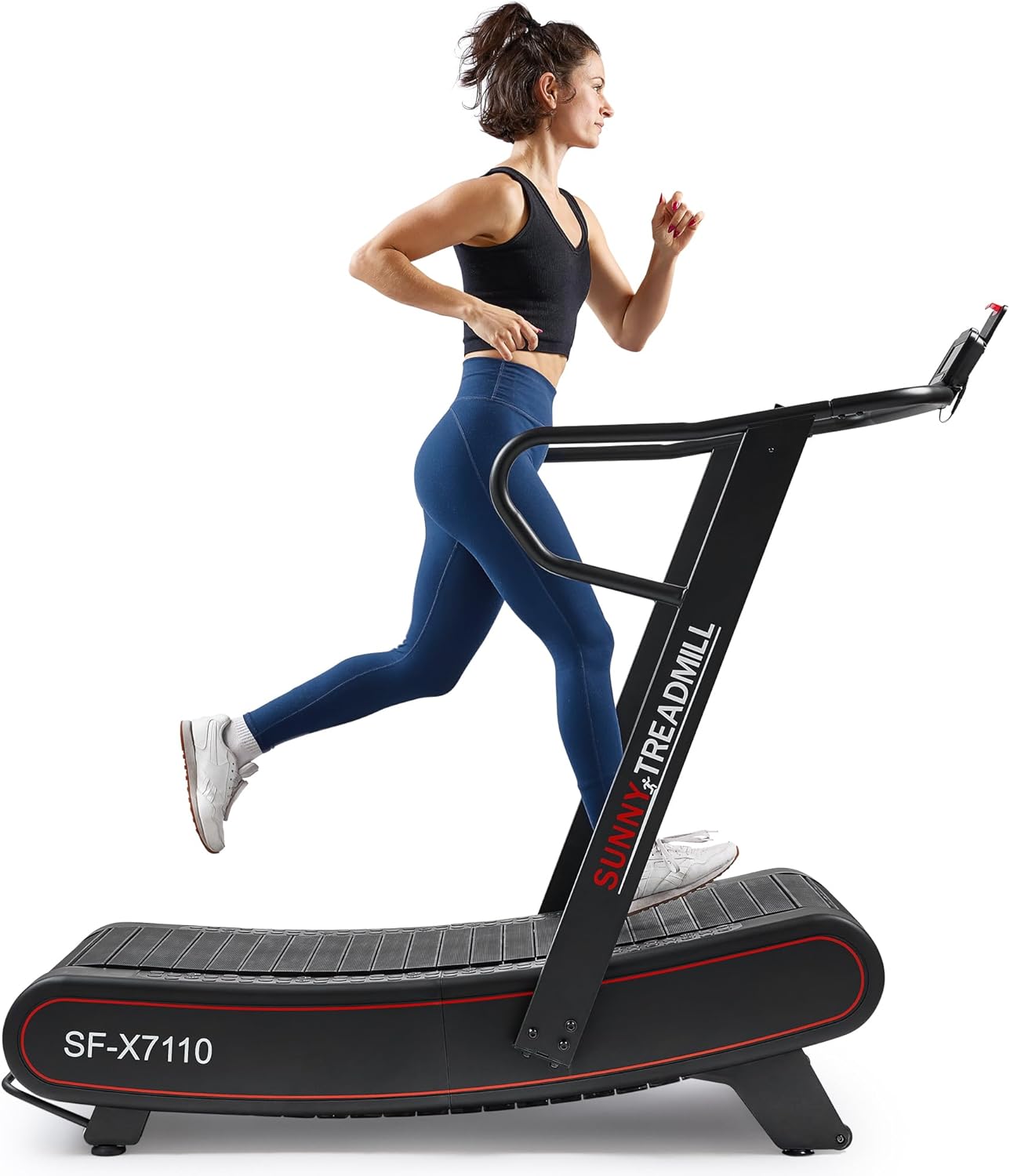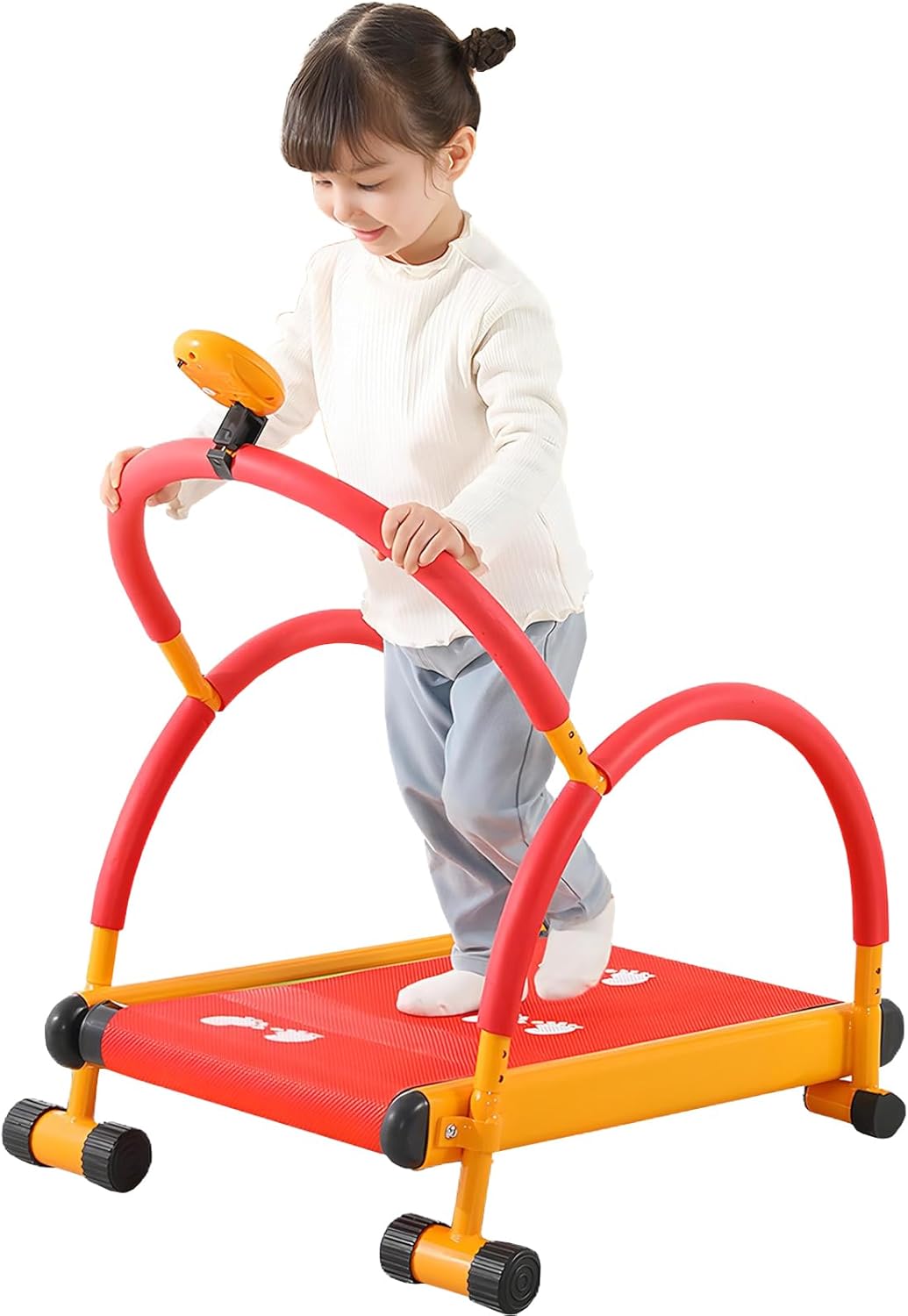
Overview
Manual or non-motorized treadmills are fitness machines powered entirely by your own movement, without relying on an electric motor. In practical terms, you propel the belt forward by running or walking on a typically curved or sloped surface, allowing the speed to adjust naturally to your effort rather than a fixed motor setting. With 13 models available in a price range of $108.88 to $2,468.38, they offer accessible entry points for home use.
This type matters for workouts because it encourages a more instinctive running form, engaging your core, hamstrings, and calves more intensely for potentially better calorie burn and muscle activation compared to motorized options. Prioritize this feature if you're a dedicated runner aiming for natural stride training, need a portable setup for travel or small spaces, or want an electricity-free alternative that builds endurance through self-generated resistance.
All Manual/Non-Motorized Treadmills


Folding Treadmill, 2.5HP treadmills for Home with Manual Incline & 12 HIIT Modes, Compact Small for Home Office, Space Saving with Large Running Area, Electric Treadmill…, Black-Orange
View on Amazon
Sunny Health & Fitness Premium Manual Treadmill – Non-Motorized, Heavy-Duty, Commercial-Grade, Adjustable Handlebar, for Endurance Training, Optional 8-Level Magnetic Assistance & Free SunnyFit App
View on Amazon
DELAVIN Curved Manual Treadmill, Non Electric Treadmill with 4 Resistance Levels, Motorless Treadmill with Front Digital Display and Handlebar, Wide Belt Treadmill 440LBS Capacity for Home Gym(FBA)
View on Amazon
Manual Small Walking Treadmill with Handle, Folding, Black, LCD Display, Adjustable Height & Slope, 242.5 Pound Capacity
View on Amazon
Toddler Treadmills for Home with Incline LED Monitor and Handle Bar, Indoor Kids Treadmill Walking Pad Workout Equipment for 3-15 Year Old, Kid Manual Treadmill Toddler
View on Amazon
Kids Treadmill with LED Display and Handle Bar, Manual Toddler Treadmills for Home with Incline, Walking Pad Treadmill Workout Equipment for Boys and Girls Ages 3+
View on Amazon
Kids Treadmill with Handle Bar and LED Display, Kids Walking Pad Treadmill, Manual Treadmills with Incline, Small Exercise Equipment for Boys Girls Ages 3+
View on Amazon
Curved Manual Treadmill, Non-Electric Curve Treadmill with 4 Resistance Levels, Self-Generated Air Runner with LCD, Commercial Motorless Treadmills for Home Gym, 450LBS Capacity, Black
View on Amazon
Walking Pad Treadmill with Incline and Handle Bar, Walking Pad with Remote Control and Incline for Home Office, Led Display
View on Amazon
Walking Pad Treadmill With Incline, Under Desk for Home Office, Portable 2.5HP, 300 lbs Capacity, APP/Remote Control, LED Displays, Manual Incline(M)
View on Amazon
340lb Capacity Walking Pad Treadmill with 12% Incline, Double Deck Under Desk Treadmill Support Full Manual/3-Preset Countdown/App Mode, Portable Treadmills for Small Spaces
View on Amazon
Exercise Treadmills,Manual Curved Treadmill ,Foldable, Non-Electric, Walking/Running Machine with LCD for Home & Office ,Black
View on AmazonWhy Manual/Non-Motorized Treadmills Matter
Manual non-motorized treadmills deliver a more authentic running experience by letting you power the belt with your own strides, which builds better form and efficiency without relying on a motor. This type stands out for buyers seeking affordability and versatility, as it eliminates electricity costs and allows workouts anywhere, from home to outdoors. Ultimately, it matters because it transforms passive cardio into an active, full-body challenge that boosts motivation and results for everyday fitness enthusiasts.
- Engages your core and legs more deeply since you must maintain momentum yourself, leading to improved balance and posture that carry over to sports or daily activities like hiking.
- Saves money long-term with no power bills or complex maintenance, making it ideal for budget-conscious users who want reliable equipment without ongoing expenses.
- Offers easy portability for those with limited space, as many fold or weigh less than motorized models, letting you store it under a bed or take it on trips for consistent training.
- Provides natural interval training by slowing when you stop, perfect for HIIT sessions that enhance endurance and fat burn without artificial speed controls.
- Appeals most to runners and athletes craving that outdoor-like resistance, helping beginners build confidence while challenging pros to refine their technique.
What to Expect at Different Price Points
Price differences in manual/non-motorized treadmills primarily stem from frame construction, running deck quality, and stability enhancements, as the core self-powered mechanism remains consistent across models. Budget options provide essential functionality with basic materials that prioritize portability over longevity, while higher prices incorporate heavier-duty components, better shock absorption, and ergonomic designs for sustained performance. Overall, investing more yields greater durability and user comfort, reducing wear during high-intensity workouts.
Basic self-powered treadmills with simple frames for everyday use.
- Lightweight construction for easy portability and storage
- Compact running surfaces suitable for walking or light running
Best for: beginners or casual exercisers seeking affordable entry points
Balanced models offering improved build quality and moderate durability.
- Reinforced frames with better weight capacity for steady workouts
- Enhanced deck cushioning to reduce joint impact during runs
Best for: regular home users wanting reliable performance without excess cost
High-end treadmills with robust engineering for demanding sessions.
- Heavy-duty steel frames ensuring stability at high speeds
- Wide, textured belts for optimal traction and comfort
Best for: serious athletes or frequent runners prioritizing longevity
How to Choose
Pro Tips
- Lubricate belt monthly for smooth, resistance-free motion
- Drive with legs and core to enhance natural running efficiency
- Secure treadmill on level surface to avoid tipping during use
- Alternate sprint-walk intervals to build endurance without motor aid
- Avoid gripping sides; let arms swing freely for balance
Frequently Asked Questions
A manual/non-motorized treadmill is a type of fitness equipment that relies on the user's own power to move the belt, without the aid of an electric motor. This design makes it more compact and portable compared to motorized versions. It's ideal for walking or light jogging and simulates natural running mechanics.
No, manual treadmills do not require electricity since they lack a motor and are powered solely by your movement. This feature enhances portability and allows use in any location without power outlets. However, ensure the surface is level for smooth operation.
Manual treadmills can be better for home use if you prioritize affordability, space-saving design, and a more natural workout feel without relying on electricity. They are generally quieter and require less maintenance. However, motorized treadmills offer more speed options and incline adjustments for varied workouts.
Yes, manual treadmills are effective for weight loss and cardio as they engage more muscle groups for propulsion, potentially increasing calorie burn. They suit users who enjoy self-paced exercises like walking or jogging. Start with shorter sessions to build endurance, as they can feel more demanding than motorized options.
Manual treadmills typically range in price from $108.88 to $2468.38, depending on features like size, durability, and foldability. Entry-level models around $100-$300 offer basic functionality for casual users, while higher-end ones provide better stability and warranties. Consider your fitness goals and space when budgeting.